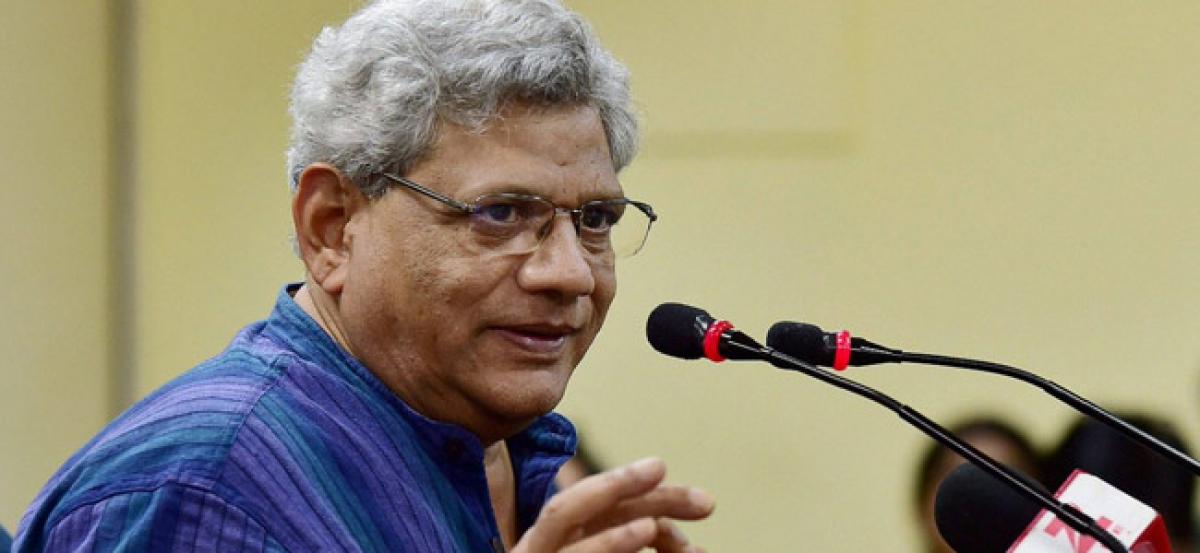Live
- Telangana Sets Record in Rice Yield with 15.3 Million Metric Tons
- Spirituality in the leadership
- Actor Kasthuri Shankar Arrested in Hyderabad Over Controversial Remarks
- Tragic Accident in Anantapur: Bride-to-Be Dies in Bike-Tractor Collision
- Are we on the edge of no return?
- Telangana Appoints Dr. Gummadi V. Vennela as Chairperson of TCAB
- Teaser for ‘Sarangapani Jathakam’ Set to Release on November 21st
- Manage C&D waste better to fight air pollution: CSE
- Grassroots democracy, an idea whose time has come
- Bejan Daruwalla’s horoscope
Just In

Communist Party of India (Marxist) (CPM) general secretary Sitaram Yechury on Thursday welcomed the Supreme Court ruling on the Right to Privacy and said that as technology has become a day-to-day affair, the far-reaching judgement will have consequences in various domains.
New Delhi: Communist Party of India (Marxist) (CPM) general secretary Sitaram Yechury on Thursday welcomed the Supreme Court ruling on the Right to Privacy and said that as technology has become a day-to-day affair, the far-reaching judgement will have consequences in various domains.
Yechury took to Twitter to congratulate all those who fought against the 'Government's sinister designs'.
"Congratulations to all lawyers, activists, others who fought this govt's sinister designs to deny Indians their fundamental right to privacy," Yechury tweeted.
"A far-reaching judgement which will have consequences in various domains, as technology is playing a greater role in our day-to-day lives," he added.
Yechury further said the top court ruling would pave the way for securing the rights of the citizens.
"We have been opposed to mandatory Aadhar, data misuse by foreign tech corporates. This judgement will pave the way for securing our rights," he tweeted.
In a landmark judgement earlier in the day, India's top court upheld the Right to Privacy as "a fundamental right."
The Supreme Court overruled the M.P. Sharma (1962) and Kharak Singh (1954) judgement and held that the Right to Privacy is a fundamental right under Article 21 of the Indian Constitution, in a unanimous decision (of the nine-judge bench).
A far-reaching judgement which will have consequences in various domains, as technology is playing a greater role in our day-to-day lives.
— Sitaram Yechury (@SitaramYechury) August 24, 2017
The verdict was given as soon as the nine-judge Constitution bench of the apex court resumed the hearing on the case on Thursday morning.
Following this, a five-judge constitutional bench will decide whether the Aadhar violates the Right to Privacy or not.
The Supreme Court, earlier on August 2, had reserved its judgement over the issue of whether right to privacy is fundamental or not.
On July 26, the Centre told the apex court that there is a fundamental right to privacy, which is a 'wholly qualified right' too.
The Centre made this submission before the nine-judge Constitution bench.
Attorney General, K.K. Venugopal told the apex court that "privacy, as a fundamental right, could have been mentioned in Article 21, but has been omitted. Right to life transcends right to privacy".
In special circumstances, the government can interfere in a matter that comes under a wholly qualified right. An absolute right cannot be reduced or amended.
Earlier on July 20, all the petitioners had completed their argument in the apex court. The petitioners contested that the twelve-digit biometric unique identification card raises privacy threat.
On June 10, the top court had ruled that from July 1 onward, every person eligible to obtain Aadhar card must quote their Aadhaar number or their Aadhaar Enrolment ID number for filing of Income Tax Returns as well as for applications for Permanent Account Number (PAN).
The Income Tax Department has stepped up its efforts to encourage people to link their PAN with Aadhar.
We have been opposed to mandatory Aadhaar, data misuse by foreign tech corporates. This judgement will pave the way for securing our rights
— Sitaram Yechury (@SitaramYechury) August 24, 2017

© 2024 Hyderabad Media House Limited/The Hans India. All rights reserved. Powered by hocalwire.com







